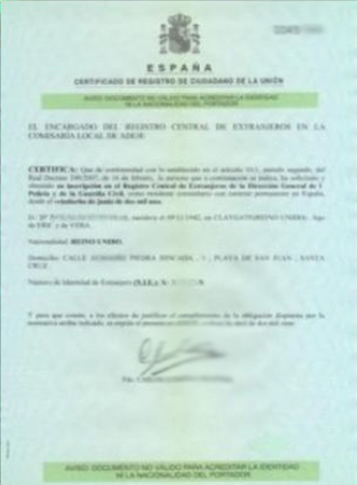1) What is the NIE?
NIE stands for “Número de Identificación de Extranjeros” or “Identification Number for Foreign Nationals”. It is a number which is unique and personal to each foreign national in Spain, akin to the ID number for Spanish citizens. It is composed of 9 digits, two of which are letters (one at the beginning and another at the end), with the remaining ones being numbers. For example, an NIE would appear as “X1234567X”.
2) What is the NIE for?
It is vital for foreign residents and owners of property in Spain – The NIE is necessary for any foreign nationals (including EU citizens) who intend to live or own property in Spain. In essence, the NIE is necessary for any economic activity in Spain (even if the NIE holder is tax domiciled in another jurisdiction), such as purchasing or selling property, registering with the tax office and paying taxes in general, purchasing or selling a vehicle, obtaining a driver´s licence, owning a company, working, accessing social security & health services, contracting utilities (e.g. water and electricity), opening a local bank account (although it is not necessary for a “non-resident” bank account), accepting an inheritance, etc.
3) What the NIE is not:
It is not an ID card – Some years ago, the NIE was issued in the form of a photo ID and served the purpose of personal identification (akin to the ID card for Spanish nationals). However, now the NIE is issued in the form of a paper a certificate without a photograph. Therefore, foreign nationals are advised to have their passport or other forms of ID in their possession when travelling and residing in Spain.
It is not a visa or residency permit – The NIE does not grant a visa or a residency permit per se. However, per the above, it is one of the requirements for foreign nationals intending to reside in Spain.
It does not imply tax residency – Although the NIE certificate may state that the holder is resident in Spain. In reality, it does not imply or result in tax residency per se. The concept is tax residency (or tax domicile) is different. At the time of this article, an individual becomes tax resident in Spain by residing 183 or more days a year in Spain (i.e. more than half of the year cumulatively).
It does not imply local residency – Foreign nationals owning property or living in Spain should register with the “municipal padron” (i.e. the municipal lists of inhabitants in a local community). Akin to the NIE, registration in the padron also does not imply tax residency. However, registration is recommended to secure: (i) tax reductions in respect of IBI Council Tax (depending on the policy of the local council); (ii) access local services; and (iii) greater investment from the central government in local services & infrastructure.
4) How does one obtain the NIE?
(i) Power of attorney – Given that our law firm specialises in advising solely international clients and local expats in Spain, the fastest and most practical way to secure the NIE for our clients is by granting a power of attorney with a specific provision authorising us to apply for the NIE on their behalf (which can be granted in Spain or abroad). All of our standard powers of attorney include a specific provision to obtain the NIE in Spain. This method avoids the need for our clients to travel to Spain and queue personally before the local police station (in particular, it also avoids the risks of delays in completing a property purchase). We only charge a small handling fee for this standard service.
(ii) In Spain – Applicants can appear in before the relevant office for foreigners at the local station of the national police (which carries out functions delegated by the Ministry of Internal Affairs). Applicants need to provide all the relevant documentation and demonstrate not be in in an irregular situation in Spain (e.g. photographs, forms and other documents to support the petition). Per the above, this method is not recommended because applicants need to queue in the early hours and may not familiarity with the required forms & paperwork.
(iii) Abroad – Applicants can appear before their nearest Spanish Consulate to request a NIE (which will also issue it on behalf of the Ministry of Internal Affairs). Per point (i) above, it is not necessary to attend before the Consulate if the applicant grants us a power of attorney.
5) How long does it take for the NIE to be issued?
It takes approx. 1-4 weeks (depending on the administrative caseload). The NIE certificate needs to be picked up by the applicant or by the attorney (in the case of an application made with power of attorney).
6) What if I live or own property in Spain without the NIE?
Numerous foreign owners in Spain who purchased years ago (in particular before the year 2005) may not have an NIE (because at the time of purchase local authorities and registries carried out a lax enforcement of the regulations). These persons are strongly advised to contact us in order to regulate their situation.
It particular, it should be noted that the NIE will be required to sell property (or to otherwise complete any of the tasks mentioned in question 2 above) and may be solicited by the tax office.
Moreover, per the above, the NIE will not result in any adverse effects for the applicant per se, such as tax residence or any additional tax obligations.
About the Author
 Lucas Bornico is a Partner at BF Solicitors (Bornico, Farquharson & Associates). He is a Solicitor (England & Wales) with numerous years of experience in London and Spain (where he is duly registered as an EU lawyer with the Spanish Bar Association).
Lucas Bornico is a Partner at BF Solicitors (Bornico, Farquharson & Associates). He is a Solicitor (England & Wales) with numerous years of experience in London and Spain (where he is duly registered as an EU lawyer with the Spanish Bar Association).
BF Solicitors is a boutique law firm of English and Spanish lawyers, which specialise in advising international clients on the Costa del Sol.
Their partner-led practice is able to provide a comprehensive service in respect of the areas that matter most to our clients, including property, conveyancing, tax, wills & inheritance, wealth management, family law, litigation and cross-border commercial & corporate transactions.
This article is intended to provide a general overview on the purchase of a property in Spain and should not be deemed to constitute legal advice. Before relying on this article and entering into a transaction, readers are strongly advised to contact BF Solicitors for a free and confidential consultation.
Head Office: Av España, 146 – Third Floor, 29680, Estepona (Malaga), Spain
www.bfsolicitors.com / Email: lucas@bfsolicitors.com / Tel: +34 952 000 031 (Spain) / +44 (0)20 7442 5810 (UK)

